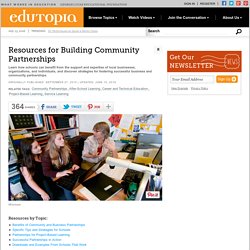

Edutopia. Blogs on Formative Assessment. The Ron Clark Academy. Ron Clark and Kim Bearden met in 2000 when Disney honored them both as Teachers of the Year.

They became fast friends as they shared their passion for students and creative teaching. In the fall of 2004, Clark and Bearden met to hold a serious discussion about something that they had casually chatted about numerous times over the previous five years: Clark wanted to start a school of his own - one that would be unlike any other. At that time, the school had no name, no funding, and no facility.
However, Clark and Bearden’s vision for the institution were tangible from the very start-- they shared common beliefs and ideas, and they knew that they were called to move forward. Bearden gave Clark her word that she would help him with the endeavor, and the dream began. Clark and Bearden actively recruited board members who shared their vision and passion. From February to March of 2007, two hundred students were interviewed to determine our first class of students.
Creating a Strong Parent Community. Hands down, teaching children is the most incredible and rewarding occupation that exists.

That being said, teaching is a complicated profession for many reasons. There are so many variables that can impact a teacher's year including: class size, administration, supplies and resources, colleagues, class makeup and of course families! A supportive parent can be a teacher's best friend. The only thing that could be better than that is a supportive group of parents! I have taught in a variety of educational settings and have worked with students ranging from toddlers to sixth graders. As teachers, we can encourage our parents to become involved in meaningful ways. List of Helpful Parent Activities: Pre-K 1. List of Helpful Parent Activities: Lower Elementary 1. List of Helpful Parent Activities: Upper Elementary 1. A classroom community is built on trust.
An Amazing Memory The best family memory I have is of a time when the entire class community was together during a publishing party. Building Community Partnerships: Resource Roundup. Discover Benefits of Community and Business Partnerships How Can High-Poverty Schools Engage Families and the Community?

: Learn about the benefits when high-poverty schools engage with community partners for support, resources, and guidance. (Edutopia, 2016) What Community Engagement in Education Looks Like . . . and Can Do: Find how how business and community involvement can make a difference for students and schools. (Edutopia, 2015) Internships and Service Learning From Research Review on Integrated Studies: Examine the research literature on specific benefits of internships and service learning and the role community plays.
(Edutopia, 2013) The Importance of Community Involvement in Schools: Read about the importance of community involvement in school success, and consider advice for schools looking to launch family and community engagement initiatives. Back to Top Explore Specific Tips and Strategies for Schools Back to Top. Back to School: A Surefire Strategy for Building Classroom Community. Unlike many of the current posts and articles in educators' discussions these days, this post does not address anything related to technology or the CCSS. It addresses a topic of much greater importance -- the emotional environment of the classroom.
Without an excellent, intentionally designed, emotional environment (one which builds authentic community in the classroom), the standards and the technologies are of little value. As Steven Covey and many others have said, "First things first! " There are three facets of a classroom and school environment: 1) the physical environment, 2) the emotional environment, and, 3) the academic environment. Each facet must be intentionally designed and maintained throughout the school year. Here's a specific classroom strategy which can be done at any time, but is especially powerful to do first thing on the first day of school -- and it's one you and your students will love! "Take What You Need" Strategy Gather your students into a circle.